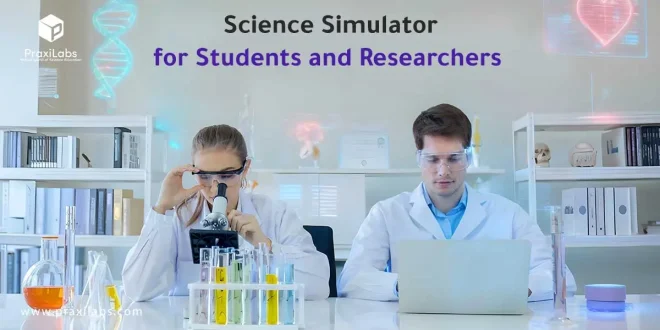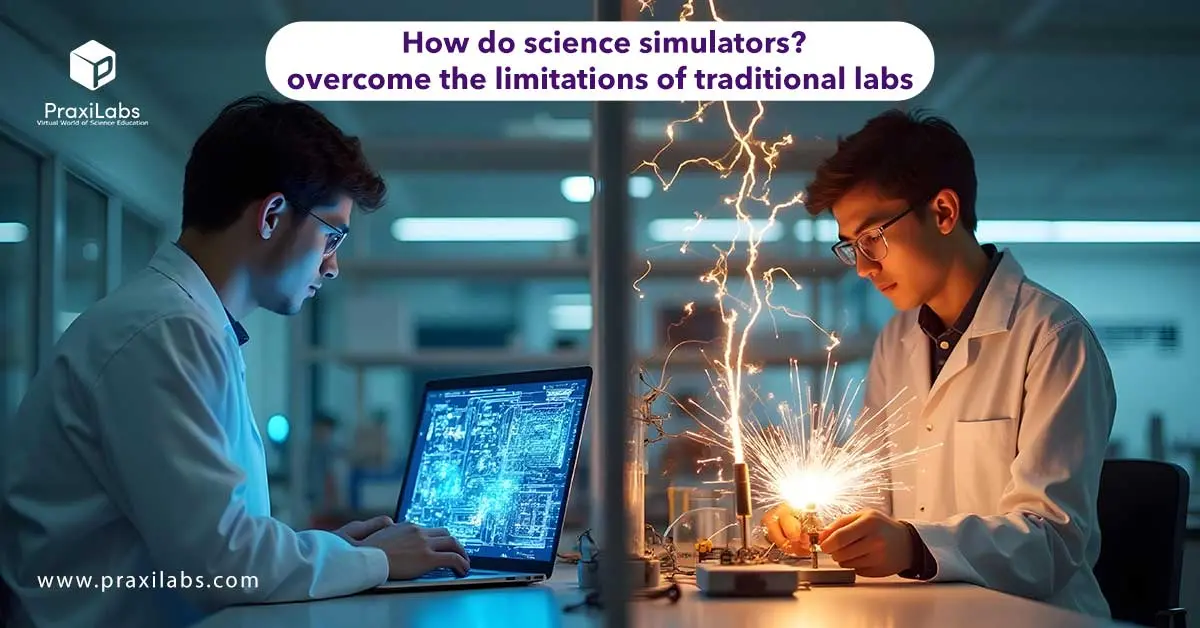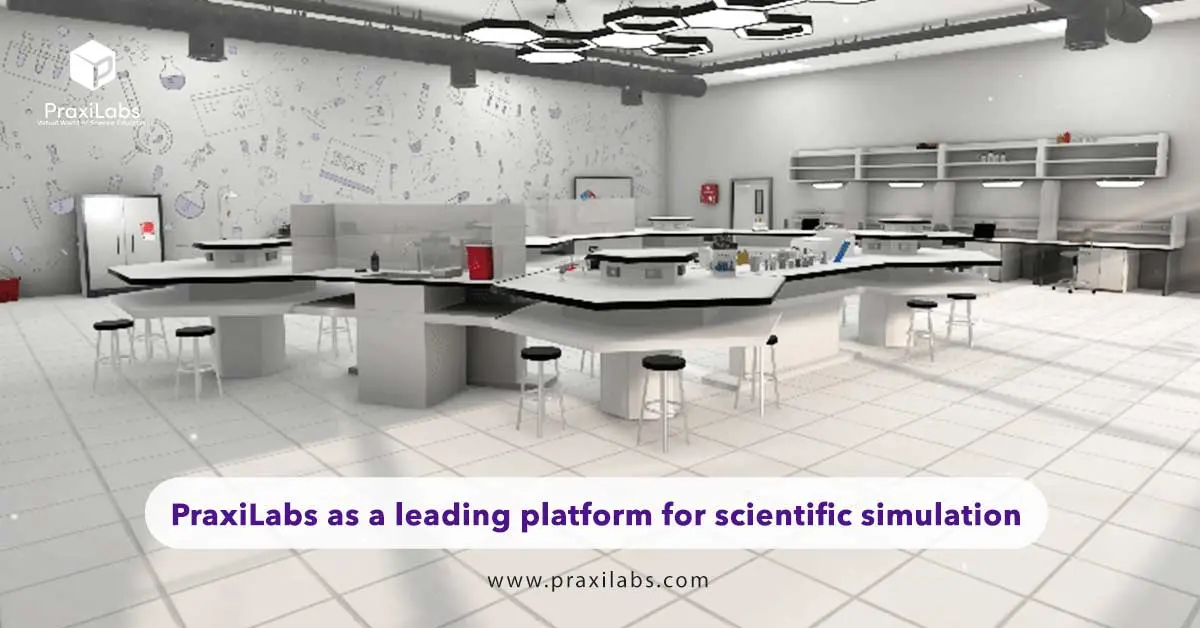Last Updated on November 4, 2025 by Muhamed Elmesery
In today’s fast-paced world of science and discovery, simulation technology is transforming the way students and researchers learn, experiment, and innovate. A science simulator provides a safe, interactive, and cost-effective environment for exploring complex experiments that would otherwise require expensive equipment or hazardous materials.
From visualizing chemical reactions to modeling physical phenomena and biological systems, these virtual labs empower learners to test hypotheses, analyze data, and gain hands-on experience—anytime, anywhere.
For educators and scientists alike, science simulators are not just tools for learning—they are gateways to limitless experimentation and discovery.
Table of Contents
What is a science simulator?
Science simulation is a computer-based technology that simulates the real environment, for example in science, a simulation lab is a 3D, immersive, and interactive simulation of experiments and activities that typically take place in physical laboratory settings.
A science simulator replicates the equipment, tools, tests, and procedures used in various branches of science, such as chemistry, physics and biology. This enables students to conduct their science experiments online, from their personal devices, anytime and anywhere, without the costs and limitations of a physical lab.
Key features of a science simulator
Science simulation apps provide several features for both students and educational institutions:
Interactive Environment:
Virtual science simulators provide an immersive and interactive experience that simulates the real laboratory environment, giving students the opportunity to gain hands-on learning in a realistic way.
Scalability:
For institutions that need to train a large number of students at the same time, virtual labs are the ideal choice. They accommodate hundreds of users simultaneously, making them highly scalable without the need for additional infrastructure.
Knowledge Retention Enhancement:
Science simulators provide scenario-based interactive learning, which enhances learners’ retention of information and increases their engagement. They are also easily accessible to a large number of students.
Data Analysis and Tracking:
Science simulators allow precise tracking of learners’ progress, as teachers can monitor the current status of each student, the steps they have completed, and the areas that need improvement, while providing multimedia reports that help develop the educational process
Enhancing Safety:
Using the virtual lab simulators ensures the protection of learners from any risks they might face during training in real laboratories. It is an effective way to prevent laboratory accidents by completely eliminating the handling of hazardous materials. Therefore, virtual laboratories provide a safe environment for learners and ensure their complete safety.
Mobility:
Virtual science lab simulators work with any internet-connected device. Whether students use a desktop computer, a laptop, a smartphone, or a tablet, virtual labs are compatible with all devices and popular operating systems, with minimal memory and browser requirements.
How do science simulators overcome the limitations of traditional labs?
Limitations of traditional labs such as:
- High construction and maintenance costs.
- Hazardous materials and safety risks.
- Limited space and scalability.
- Low student engagement in conventional lab settings.
- Lack of flexibility for remote or self-paced learning.
Science simulators such as PraxiLabs provide solutions to these limitations by introducing:
- Immersive 3D simulations in science with step-by-step, interactive guidance.
- Multimedia-rich learning featuring videos, text, and tutorials.
- Seamless LMS integration and real-time analytics.
- Custom labs with localized content in both English and Arabic.
How do researchers benefit from simulation labs?
Simulation labs enable learners and researchers in various fields to acquire practical skills and hands-on experience in a virtual learning environment without needing for physical resources or tools.
According to a study on the role of virtual simulations laboratories in developing skills and scientific attitude, the results showed that these laboratories enhance trainees’ problem-solving, critical thinking, and creativity skills, as well as improving conceptual understanding, scientific process, and laboratory skills.
They also increase users’ interest, awareness, and overall learning outcomes. Therefore, teachers should make use of virtual laboratories to improve the quality of education and their students’ learning outcomes.
How do simulations help students build confidence in STEM learning?
By allowing students to experiment safely, make decisions, and instantly see the results, simulations bridge the gap between theory and practice.
They prepare learners for real-world challenges while fostering curiosity, confidence, and critical thinking—making them an essential part of modern education.
Explore: Why Every University Should Use a STEM Virtual Lab?
PraxiLabs as a leading platform for scientific simulation
PraxiLabs virtual labs provide a complete learning experience for students by offering virtual laboratories that cover a wide range of science topics in chemistry, physics, and biology within a completely safe and risk-free environment, with the ability to conduct experiments anytime and anywhere.
With PraxiLabs, students gain a comprehensive experience, with guidance and educational materials to support the learning process rather than just observing and completing the experiment. Students can actively learn while conducting their experiments.
- 65% of learners are visual, so we provide multiple forms of multimedia.
- 30% are auditory, so we use voice guidance.
- 5% are kinesthetic, so we provide a more “hands-on” virtual experience.
Explore: Why Educational Simulations are Essential in Modern Education?
Everything you need to start using our virtual lab:
- Create a free account: No need to set up equipment or use a credit card. Start in seconds.
- Choose from over 200 simulations: Select three free simulations and start the experience immediately.
- Practice without limits: Repeat experiments as many times as you like.
- Get support: Your lab partner will guide you step by step, along with instructional videos and interactive lessons.
Explore PraxiLabs’ large library of science simulations
PraxiLabs’ scientific simulation software provides over 210 science simulations across more than 20 branches of science, which include:
Physics
- Heat and Thermodynamics Experiments.
- Mechanics.
- Properties of Matter.
- Electricity.
- Magnetism.
- Modern Physics Simulations.
- Wave Experiments.
Chemistry
- Basic Radical tests (Inorganic Chemistry).
- Organic Chemistry.
- Acidic Radical tests (Inorganic Chemistry).
- General Chemistry.
- Analytical Chemistry.
Biology
- Physiology.
- Cell Culture.
- Toxicology.
- Bioenergetics.
- Biochemistry.
- Molecular Biology.
- Immunology.
- Microbiology.
Why is PraxiLabs the ideal solution for your university?
After deploying PraxiLabs in 7 Egyptian universities:
- We reduced lab costs by 65%.
- Students’ practical skills improved by over 60%.
- Professors saved hundreds of hours of preparation time.
Frequently Asked Questions
How to implement a scientific simulation in physics?
The implementation involves setting up a computational environment, writing a main loop to update the simulation state over time, and handling physics calculations for forces, velocities, and positions.
Finally, visualize and validate your results against theoretical or experimental data.
Are scientific simulations often misleading?
Scientific simulations can be misleading if not properly understood, as they are often based on simplifying assumptions and are imperfect representations of reality.
 PraxiLabs A virtual world of science
PraxiLabs A virtual world of science








